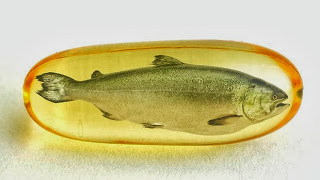Fish Oil Weight Loss Fish oil has the potential to help with weight loss and fat metabolism. Certain factors can these positive effects and others can completely undermine them.
Many studies have explored the effects of fish oil weight loss. However, comparatively few have contended with factors that can influence the results, either positively or negatively. If you search for studies on fish oil vs. weight loss on our national medical database, PubMed, you will find studies that show seemingly contradictory results.

One of the truly helpful studies that include the effects of other factors was published in 2007 in the American Journal of Clinical Nutrition. It showed that omega-3 fatty acids (i.e., fish oil) do, indeed, provide positive results for decreasing fat mass and increasing lean mass, whereas omega-6 fatty acids (i.e., sunflower oil) do just the opposite.
Furthermore, the most important factor for enhancing the benefits of fish oil for weight loss is exercise. Moderate exercise (i.e., walking 3 days per week for 45 minutes at 75 percent of age-predicted maximal heart rate) significantly boosts the positive effects of fish oil. Effects of fish oil for reducing fat mass and building lean mass are inconsequential in the absence of exercise.
After taking into account all the seemingly contradictory results of multiple studies regarding the effects of fish oil on weight loss, we can consistently see four take-home lessons:
1) Vegetable oils undermine the benefits of fish oils. This lesson points directly to the modern intake of omega-6 to omega-3 fatty acids in a ratio of about 20:1, which should be closer to about 2:1. In other words, we should consume less vegetable oil and more fish oil.
2) The positive effects of fish oil for fat loss and lean body mass are enhanced by even moderate exercise. Indeed, such effects are insignificant without exercise.
3) The benefits of fish oil can be completely undermined by dietary sugar. Indeed, fructose and its occurrence in so many foods and beverages can be especially harmful against the otherwise beneficial effects of fish oil.
4) The minimum intake of fish oil should be at least 1.5 grams per day, with 2-3 grams being even better. The best fish oil supplements offer the highest amounts of the two main omega-3 fatty acids from fish - i.e., EPA and DHA.
Many studies have explored the effects of fish oil weight loss. However, comparatively few have contended with factors that can influence the results, either positively or negatively. If you search for studies on fish oil vs. weight loss on our national medical database, PubMed, you will find studies that show seemingly contradictory results.

One of the truly helpful studies that include the effects of other factors was published in 2007 in the American Journal of Clinical Nutrition. It showed that omega-3 fatty acids (i.e., fish oil) do, indeed, provide positive results for decreasing fat mass and increasing lean mass, whereas omega-6 fatty acids (i.e., sunflower oil) do just the opposite.
Furthermore, the most important factor for enhancing the benefits of fish oil for weight loss is exercise. Moderate exercise (i.e., walking 3 days per week for 45 minutes at 75 percent of age-predicted maximal heart rate) significantly boosts the positive effects of fish oil. Effects of fish oil for reducing fat mass and building lean mass are inconsequential in the absence of exercise.
After taking into account all the seemingly contradictory results of multiple studies regarding the effects of fish oil on weight loss, we can consistently see four take-home lessons:
1) Vegetable oils undermine the benefits of fish oils. This lesson points directly to the modern intake of omega-6 to omega-3 fatty acids in a ratio of about 20:1, which should be closer to about 2:1. In other words, we should consume less vegetable oil and more fish oil.
2) The positive effects of fish oil for fat loss and lean body mass are enhanced by even moderate exercise. Indeed, such effects are insignificant without exercise.
3) The benefits of fish oil can be completely undermined by dietary sugar. Indeed, fructose and its occurrence in so many foods and beverages can be especially harmful against the otherwise beneficial effects of fish oil.
4) The minimum intake of fish oil should be at least 1.5 grams per day, with 2-3 grams being even better. The best fish oil supplements offer the highest amounts of the two main omega-3 fatty acids from fish - i.e., EPA and DHA.
0 komentar:
Posting Komentar